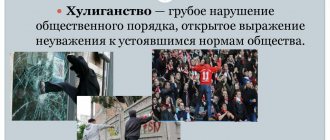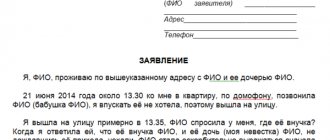Art. 148 of the Criminal Code of the Russian Federation, which provides for criminal prosecution for insulting the feelings of believers - one of the forms of implementation provided for in Art. 28 of the Basic Law (Constitution) rights: to be free to choose religion and beliefs, to adhere to traditional views or to consider oneself an unbeliever, to share the point of view about the existence of higher powers or to deny them.
Considering that the Russian Federation is one of the largest multinational and multi-religious powers on the planet, legal regulation and streamlining of relations in this area for the state is a guarantee of stability and peaceful coexistence of all its peoples and ethnic groups.
Multi-channel free hotline Legal advice on criminal law. Every day from 9.00 to 21.00
Moscow and region: +7 (495) 662-44-36
St. Petersburg: +7 (812) 449-43-40
The law on insulting the feelings of believers: yesterday and today
Until 2013, the article “insulting the feelings of believers” of the Criminal Code of the Russian Federation was characterized by a lack of specificity and “fuzzy” wording, which led to an ambiguous understanding of the legal norm by subjects applying it in practice.
So, the old version of Art. 148 of the Criminal Code of the Russian Federation prohibited:
- Create illegal obstacles to the activities of associations of believers;
- Create unlawful interference with the performance of canonical rites.
All this, as well as the lack of official clarification of the text of the legal norm by the highest judicial authorities, led to a relatively small number of completed criminal cases sent to court, and an even smaller number of criminals convicted of disrespect for the beliefs of others.
The situation changed after a public offensive action by representatives of the so-called “Punk rock group “Pussy Riot” near the Cathedral of Christ the Savior, which caused a wide public outcry. This demonstrative outrage against the religiosity of other people was qualified only under Art. 213 of the Criminal Code of the Russian Federation, since, according to the version of Art. 148 of the Criminal Code of the Russian Federation, did not fall within the scope.
The logical result of the events described was the adoption by the State Duma of the Russian Federation of Federal Law No. 136-FZ of June 29, 2013, which significantly changed the structure and content of the legal norm. Although, according to many lawyers, the amendments added more questions than eliminated existing contradictions.
Is it possible to hold the offender accountable?
It will be necessary to prove that the non-believer by his actions insulted the religious feelings of people.
Federal legislation does not define what exactly religious feelings will be. According to the comments made on the Penal Code, deep affection and faith in the object of worship should be considered religious feelings. An example is the performance of the Pussy Riot group at the Cathedral of Christ the Savior. The band members received real sentences for a punk prayer performed in a church. The court assessed the performance not only as a violation of the feelings of believers, but also as hooliganism. Not every negative statement can be regarded as humiliating the feelings of believers. For example, it is impossible to say unambiguously whether the lines from the song “I hide the cross from my neck” are a humiliation of the feelings of believers or not. To correct this misunderstanding, a linguistic examination is carried out. The study is ordered by the court. Experts give their answer after conducting the research.
https://youtube.com/watch?v=T7FIKwA5PhM%3Ffeature%3Doembed
What is a crime?
To answer the question of what kind of insult to faith will be considered criminal, one should refer to the provisions of Art. 14 of Chapter 3 of the Criminal Code of the Russian Federation, which provides the official interpretation of the category “crime”.
The type of offense under consideration has all the characteristics that make it possible to classify it as criminal:
- guilt - an act is punishable only if there is a deliberate mental attitude towards it on the part of the offender;
- public danger - disrespect for the feelings of admirers of shrines poses a significant threat to society and can cause significant harm to protected interests;
- illegality - deviant behavior contradicts generally accepted norms of morality and law;
- Punishability - for damage caused (moral, material, etc.), the sanction of a legal norm provides for punishment corresponding to the severity of the offense and the circumstances of its commission.
The listed characteristic features of a criminal tort make it possible to distinguish it from Art. 5.26 Code of Administrative Offenses of the Russian Federation. In addition, the division of related criminal acts and their difference from administrative offenses is determined by the objective side and other elements of the crime.
What specific actions are punishable?
The objective side of the corpus delicti of a violation of the criminal law includes the external manifestations of illegal acts and answers the questions: how exactly the act was committed, what specific criminal acts were expressed, what instruments of crime were used by the attacker and others.
The objective side of destructive behavior provided for in the article for insulting the feelings of believers can be expressed in:
- A clear manifestation of disrespect for society, pursuing the goal of humiliating theistic views, committed in public;
- Illegal groundless obstruction of the activities of religious organizations permitted by law;
- Illegally interfering with the implementation of permissible theistic activities.
It cannot be said that such legislative determinants are understood and accepted unambiguously by all lawyers. However, you can still try to reduce them to some common denominator, using legal analogies.
So, part 1 of Art. 148 of the Criminal Code of the Russian Federation has common features with criminal hooliganism (Article 213 of the Criminal Code of the Russian Federation) in terms of “obvious disrespect for society.” From the explanations of the Supreme Court of the Russian Federation on criminal trials on hooliganism, it follows that such disrespect is a conscious and purposeful gross disregard for the norms of morality and human coexistence, pitting the subject against others and demonstrating ignorance of their interests and opinions.
Publicity is explained by the official interpreter as a form of realization of criminal intentions, which presupposes the inevitability of its perception by a non-personified (undefined) circle of people:
- demonstration events in public places;
- placement of banners and posters, the content of which can be read by many people, etc.;
- publication of materials using telecommunication networks (including the Internet);
- handing out booklets and leaflets in parks, squares, etc.;
- sales of printed products that can be purchased by persons unfamiliar to the seller;
- other promotions that involve familiarization with a wide range of people.
Public disrespectful actions in relation to Art. 148 of the Criminal Code of the Russian Federation, are necessarily accompanied by the goal of insulting the religious feelings of believers, and this attitude must be covered by the subjective attitude of the offender.
Part 2 Art.
148 of the Criminal Code of the Russian Federation introduces a qualified element of public tort that degrades religion - prohibited behavioral acts in a place specially designated for religious services. These, in addition to the corresponding temples, include purposefully allocated premises in:
- Institutions that provide isolation from society.
- Hospitals and other medical institutions.
- Boarding schools for orphans.
- Nursing homes and other public places.
Here the concentration of true believers is increased, and offensive acts in such premises are recognized as highly blasphemous and cause greater moral damage. This determines the identification of the act and the tightening of sanctions.
Illegal obstruction of the activities of religious organizations - measures to limit the functioning of a voluntary association of people formed in accordance with the established procedure, the main purpose of which is joint worship. For example, illegally disconnecting a church from life support systems to limit its attendance by parishioners.
Illegal obstruction of canonical events is the creation of interference in processions and processions authorized by regulatory structures, or other procedures carried out in specially designated places and provided for by the tenets of legitimate religion.
Part 4 art. 148 of the Criminal Code of the Russian Federation qualifies as punishable the creation of obstacles to the implementation of theistic activities and spiritual events committed:
- a person using for these purposes the powers granted by service - an employee of the administrative government apparatus at any level, performing any administrative functions, as well as the management of commercial or non-profit organizations on which the functioning of a religious organization depends;
- with the use of violent means or their threat - causing bodily harm of any severity or demonstrating the intent to cause them, ranging from the threat of minor harm to health and ending with murder.
Based on the circumstances, the act of a person using his official position may additionally be qualified as a crime against the existing management order.
An example of such a situation: a civil servant, in the interests of third parties, interferes freely or for compensation with the performance of the functions of a religious association; if there is evidence, he may be held accountable for abuse of power or taking a bribe. Causing serious harm to health simultaneously with the described criminal act is also additionally punishable by the corresponding norm of criminal law.
Changes in legislation
Until 1997, the version of the Criminal Code in force in the Russian Federation provided for imprisonment for crimes of a religious nature.
According to Art. 143 of this document, violators of established norms were threatened with a fine or imprisonment (up to 3 years).
Any actions that prevented believers from expressing their views and adhering to their chosen religion were considered a violation: violent actions, threats, damage to the property of citizens and public religious organizations, etc.
If illegal actions were expressed exclusively in insults of a public nature and carried out with the involvement of the media, then the term of imprisonment was reduced to 1 year, until a commensurate fine was paid.
From 1997 to 2013, crimes of a religious nature were classified as administrative offenses and were considered by the corresponding article of the code, which is still in force.
During this period, any illegal acts that prevented people from freely expressing their religious beliefs, choosing a religion, or joining organizations entailed the imposition of a fine on the perpetrators.
Also, fines were provided for public desecration, damage, or destruction of religious objects (emblems, symbols).
Amendments in 2013 regarding this issue:
- the onset of criminal liability;
- increase in administrative fines.
How can you determine whether specific statements are offensive?
The goal of a destructive, humiliating impact on the value system of believers was introduced by the legislator into the design of the norm as a mandatory element of the composition. Without it, it is impossible to prosecute.
To understand what the essence of insult is, it is worth turning to administrative legislation, since in 2011 this act was decriminalized and included in the Code of Administrative Offenses of the Russian Federation (Article 5.61).
Insult is understood as actions or statements that humiliate another person, expressed in an indecent form.
This offense should be distinguished from libel – the dissemination of knowingly false information that damages the reputation of the victim.
As can be seen from the above definitions, providing truthful information to outsiders can also be considered an insult, but in a form that is not generally accepted and causes rejection among people.
Regarding insults to the views of believers, to insult means:
- Act publicly.
- Express through your actions a clear disregard for social norms and rules.
- To humiliate in an indecent manner the worldview of at least two adherents of religions permitted in Russia.
In the presence of the above conditions, in particular, the following offenses can be recognized as criminal: ridicule of theistic canons and dogmas accompanied by obscene language, rude criticism of a person’s personal traits associated with belief, indecent behavior in relation to revered objects of worship, nudity and posing in or in front of temples, putting derogatory texts on T-shirts and much more.
Are all religions equal before the law?
Legislation regulating issues of religious organizations and denominations obliges government institutions to distance themselves from the sphere of activity of associations of believers, if its content does not contradict legal guidelines.
This means that in the event of the birth of any new, non-traditional spiritual community, its founders are required to register with the authorities as a religious association. Having gone through the necessary registration procedures, the association is endowed with the same legal status as common beliefs - Christianity, Islam and other directions.
The same legislation prohibits the formation and functioning of associations whose tasks and content of activities contradict the legal basis.
A violation of the law may occur when a religious organization:
- has a destructive impact on the general security of society;
- engages in extremism;
- destroys family values;
- limits the legal status of a person;
- harms moral public principles, people's health, corrupts them, conducts hypnotic sessions and approves of the use of drugs or psychotropic substances;
- promotes suicide or denial of medical care as an ideology of faith;
- limits the participation of a parishioner and his children in compulsory educational programs;
- forces followers to transfer property rights free of charge in favor of third parties or the association itself;
- calls for violation of legal norms and regulations;
- forcibly retains members of the association within its composition.
If a religious community carries out at least one of the above actions, the competent law enforcement agencies will suspend its functioning in court or take measures to liquidate the association as a legal entity.
To summarize, we can say that all religions and their followers have the same rights and bear equal responsibilities as long as they are within the legal framework established by the state.
Arbitrage practice
As noted earlier, due to the ambiguity and lack of clarifying judicial interpretation, judicial practice in criminal cases involving crimes under Art. 148 of the Criminal Code of the Russian Federation, does not differ in breadth or diversity. However, such cases are still brought to their logical conclusion.
Let's try to highlight the most significant of them:
- B. and Z., being adherents of Islam and showing their disrespect for Christianity, pursuing the goal of desecrating the feelings of supporters of the Christian faith, humiliating the shrine they revered, planned a criminal act in order to insult the feelings of believers. In pursuance of their criminal intent, B. and Z. jointly made a model of a human figure. Knowing for sure that the result of their desecrating actions would become known to a wide circle of people, they placed a model of the figure on a worship Orthodox cross in the form of a crucified man, after which they attached a clown mask and hat to the head of the model and made an inscription threatening Christians. By a court verdict, B. and Z. were found guilty of committing a crime under Part 1 of Art. 148 of the Criminal Code of the Russian Federation. A sentence of 230 hours of compulsory labor was imposed.
- D., guided by his value system and showing clear disrespect for society, in order to publicly insult the feelings of supporters of the Orthodox faith, photographed his reflection with an icon depicting the face of a saint revered by Orthodox believers. Continuing his criminal intent and realizing that his actions would become public knowledge, D., using a personal computer connected to the Internet telecommunications network, posted the specified photograph on his page as a user of the social network “VKontakte”, accompanying it with obscene and offensive comments for believers addressed to the depicted on the icon of the saint.
The criminal case was terminated by the court in accordance with Art. 25.1 of the Criminal Procedure Code of the Russian Federation and 76.2 of the Criminal Code of the Russian Federation with the release of D. from criminal liability and the imposition of a criminal law measure in the form of a fine.
It should be noted that a significant number of trials in such categories of cases are accompanied by close public attention, as they address issues that are especially sensitive to citizens. For example, the case of the so-called “Pokémon catcher” R. Sokolovsky, widely covered in Russia and abroad, including the European media.
Legal advice on comments to Art. 148 of the Criminal Code of the Russian Federation
- Timur Grikhanov
Qualification of crimes according to the blanket norms of the Criminal Code of the Russian Federation.
norms of international law (part 2 of article 1 of the Criminal Code of the Russian Federation), international treaties (part 3 of article 11, parts 2 and 3 of article 12, part 2 of article 13), norms of international law (part 4 of article 11), the law of a foreign state (Part 1 of Article 12), penal...
Good evening! I would like to know if I have the right to demand compensation for damage to property in a civil court. The essence of the matter is that I am an individual entrepreneur, in my cafe bar, visitors dropped a karaoke microphone (there are video camera recording files), those responsible for this refused to pay for the damaged microphone, as a result why the police were called, where they took an explanation from the perpetrators and recorded everything. Then the initiation of a criminal case was refused under Art. 167 h
1 of the Criminal Code of the Russian Federation, taking into account that there is sufficient data indicating the absence of corpus delicti, there is no intent, and socially dangerous consequences do not pose a public danger, taking into account paragraph 2 h
1 tbsp. 24, part 3 art. 27, art. 144,145 and 148 of the Code of Criminal Procedure of the Russian Federation.
- You have the right to demand compensation for damage caused to you (and not damage to property) not only in civil, but also in military court in accordance with the norms of Part 1 of the Civil Code of the Russian Federation.
Problem on constitutional law.
- here we need requalification for Art. 213. UKRF - blasphemy, or 214 of the Criminal Code of the Russian Federation - vandalism.
08/17/2014 my 5-year-old son fell into a sewer well without a manhole cover and the base of the cover being level with the ground
- What's the question? Appeal the refusal decision and write what you disagree with; at the end of the decision it should indicate who to appeal. You need to watch the child. Double on the street
Dear lawyers, lawyers, please help!!. A criminal case has been initiated against me under Art. 171 ch2p.”v”, in a nutshell, the absence of a construction license during the fall of 2008, money for completed municipal contracts passed through the current account, The question is whether the criminal case can be terminated due to a change in the situation, since the corresponding federal law No. 148 was issued dated July 22, 2008, which states that in the period from 01/01/2009 to 01/01/2010 you can engage in construction on the basis of a license or permission from the “SRO”, and from 01/01/2010 the license ceases to be valid at all, all work carried out by me do not even fall under the clearance of “SRO”, or is it better to delay the process until the new year? Please tell me what is the best way to proceed and whether anyone has had similar cases in practice, thanks in advance!
- Lawyer's answer:
Art. 77 of the Criminal Code “due to changes in the situation” has become invalid. – Federal Law of December 8, 2003 N 162-FZ, see commentary to Roman Kozhev’s answer, there cannot be a reverse rule, since the criminal law itself has not changed! Now, if they canceled it, it would be a different matter... You have already committed a crime! and if a case has already been initiated, it will be brought to trial - 99%, especially under Art. 171 is a good indicator









